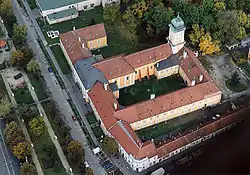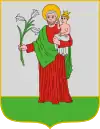Csorna
Csorna is a town in Győr-Moson-Sopron county, Hungary.[2] Csorna is located near the Fertő-Hanság National Park. There are two districts in the town: the Földsziget and the Csatárimajor.
Csorna | |
|---|---|
 Aerial view | |
 Flag  Coat of arms | |
 Csorna Location of Csorna | |
| Coordinates: 47.6167°N 17.2500°E | |
| Country | |
| County | Győr-Moson-Sopron |
| District | Csorna |
| Area | |
| • Total | 9,195 km2 (3,550 sq mi) |
| Population (2019) | |
| • Total | 10,105[1] |
| Time zone | UTC+1 (CET) |
| • Summer (DST) | UTC+2 (CEST) |
| Postal code | 9300 |
| Area code | (+36) 96 |
| Motorways | M85, M86 |
| Distance from Budapest | 155 km (96 mi) East |
| Website | www |

Etymology
The name comes from Slavic *Cherna/Chorna (black), see also e.g. Čierna, Černá or Czarna.[3][4]
Twin towns — sister cities
Csorna is twinned with:
 Heumen, Netherlands
Heumen, Netherlands Sinzing, Germany
Sinzing, Germany Lunca de Sus, Romania
Lunca de Sus, Romania
Jews
Jews first settled in the town in the second half of the 18th century, at the invitation of the estate owner, count Eszterhazy. The majority were engaged in commerce, while there were some industrialists. The community was organized in 1853. the synagogue was built in 1854 and enlarged in 1884. because of differences between haredim and maskilim (reformer) at the Jewish congress in 1868, the community affiliated with the orthodox stream (which refused to accept the decisions of congress). In 1885 land was obtained for a cemetery and a Khevra Kadisha was established. There were also a school, Talmud Torah and charitable institutions.
In World War I 19 Jews fell in action. During the period of the "White Terror" (1919–21) one Jew was murdered.
In 1930 the community numbered 795 Jews.[5]
The Holocaust period
In 1941 Jewish males were conscripted for forced labour (work on fortifications and in services together with other Hungarian citizens whom the authorities would not permit to join the armed forces).
In May 1944 a ghetto was set up in Csorna, in which the Jews from the surrounding area were also confined. They were sent on foot and in carts, often for long distances. On 18 June they were all sent to the ghetto in Sopron, and on 5 July they were transported to Auschwitz.
In April 1945 Jewish workers from a forced labour unit at the extermination camp at Balf were brought to the municipal hospital in csorna. They were wounded, having been shot by members of the S.S. and men of Szalasi's "Arrow Cross" fascist party. They all died and were buried in the Jewish cemetery.
After the war, some tens of survivors returned who renewed communal life. In 1955 there were 70 Jews in the area, including 22 children born after the war.[5]
Sport
The association football Csornai SE, competing in the Nemzeti Bajnokság III, are based in the town.
Notable people
- János Áder – President of Hungary
- David Gestetner – inventor of the Gestetner duplicating machine
- Zoltán Szarka – Hungarian footballer
External links
| Wikimedia Commons has media related to Csorna. |
- Official website in Hungarian
- Csorna, Hungary - JewishGen
References
- Csorna, KSH
- Hotels Csorna Archived 2014-07-28 at the Wayback Machine.
- Stanislav, Ján (2004). Slovenský juh v stredoveku II (in Slovak). Slovenské literárne centrum. p. 114. ISBN 80-88878-89-6.
- Kiss, Lajos (1978). Földrajzi nevek etimológiai szótára (in Hungarian). Budapest: Akadémiai. p. 167.
- "The Jewish Community of CSORNA". BH Open Databases.

